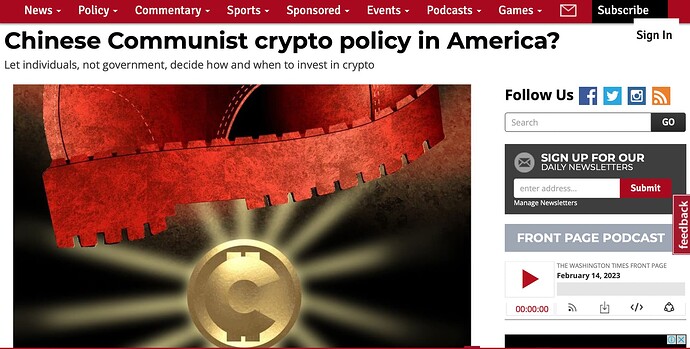- 加密货币是颠覆性的创新,有些人觉得不放心,有人呼吁像中国一样禁止它们。
- 传统的货币体系依靠中央机关来控制货币和交易,但像比特币这样的去中心化的加密货币消除了对银行和中央机关的需要。
- 比特币是通过开源软件维护的,可以通过用户的共识进行修改,使其透明化并抵制滥用。
- 加密货币为没有银行账户的人提供了使用银行业务的机会,并能帮助防止通货膨胀和汇率操纵。
- 一些反对加密货币的人认为它们是 “狂野的西部”,并希望禁止它们以保护大型银行免受竞争。
- 中国共产党(CCP)禁止加密货币,以维持其对货币供应的控制,防止中国公民将金融资产转移到中国境外。
- 中共还推出了自己的数字人民币,它可以控制并用于跟踪公民的消费。
- 在美国禁止加密货币将与中国的禁令类似,因为两者的动机都是希望利用政府权力来保护中央集权的货币体系和巨型银行。
- 应该允许加密货币在市场上竞争,投资决定应该留给个人,而不是由政府来决定。
- 像比特币这样的加密货币是创新的,可以降低交易成本,对抗政府审查,并通过投资创造繁荣,同时扰乱既定的银行利益。
- Cryptocurrencies are disruptive innovations that some people find unsettling, and there are calls to ban them like in China.
- Traditional monetary systems rely on central authorities to control currency and transactions, but decentralized cryptocurrencies like Bitcoin eliminate the need for banks and central authorities.
- Bitcoin is maintained through open-source software that can be modified by consensus of its users, making it transparent and resistant to abuses.
- Cryptocurrencies provide access to banking for the unbanked and can help safeguard against inflation and exchange rate manipulation.
- Some detractors of cryptocurrencies see them as the “Wild West” and want to ban them to shield mega-banks from competition.
- The Chinese Communist Party (CCP) banned cryptocurrency to maintain its control over the money supply and prevent Chinese citizens from transferring financial assets outside of China.
- The CCP also rolled out its own digital yuan, which it can control and use to track citizens’ spending.
- Banning cryptocurrencies in the US would be similar to China’s ban, as both are motivated by the desire to use government power to protect centralized monetary systems and mega-banks.
- Cryptocurrencies should be allowed to compete in the market, and investment decisions should be left to individuals, not dictated by the government.
- Cryptocurrencies like Bitcoin are innovative and can reduce transaction costs, fight government censorship, and generate prosperity through investment, while disrupting established banking interests.
链接:Chinese Communist crypto policy in America? - Washington Times
